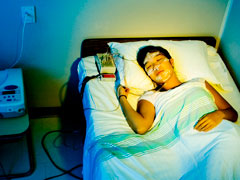Sleep Deficiency
"People should be trying to get seven to nine hours of sleep in general and it should be of good quality. It shouldn't be drug induced. It shouldn't be alcohol induced."
"It's as important as exercise and eating right. ... There is more and more accumulating evidence where we are realizing that bad sleep equals bad health."
"You could stay up and putter away at a repetitive tedious task but if you want to do something where you have to think clearly and be effective in your work, you're far better off getting sleep. Studies have shown that if you stay up a lot, you can still continue doing a menial, simple task but you'll make more errors and you'll be less aware that you're making errors."
"The part of your brain that sleeps the most is your frontal lobes -- the parts that make us human, the parts that give us deep insight, higher order cognitive functions. In the day, we acquire experiences, we learn, we make connections in our brain. But there's a lot of unnecessary stuff, a lot of wasted space, a lot of wasted energy. What sleep is really god at is trimming out the junk; the junk is washed away so that the brain is ready to adapt the following day."
Dr. Brian James Murray, associate professor of neurology, director of the sleep laboratory, Sunnybrook Health Sciences Centre, Toronto

"You often hear people say that a hypnotic [prescribed sleeping pill] is useful for falling asleep, possibly even maintaining sleep, but they tend to feel tired the next day or even hung over. In that case, it's hard to argue that the hypnotic is solving the problem."
"People want good sleep for good wake. If the wake isn't good then the sleep must not be restorative."
Dr. Patrick Fuller, associate professor of neurology, Harvard Medical School, Cambridge, Mass.
Over time, a lack of adequate sleep leads to a diminishing health profile for people suffering from difficulties achieving normal sleep patterns and required length of sleep. Studies have connected the lack of sleep with increased risk of heart attack, stroke, diabetes, obesity, infertility and problems with mental health. The loss of an hour of sleep weekly can itself lead to a higher risk of heart attack. In Canada alone, Statistics Canada estimates there are 3.3-million Canadians suffering problems sleeping or remaining asleep.
People who suffer from chronic sleep deficiency often sleep no more than five hours nightly. A 2011 Canadian study discovered that 60 percent of Canadians average an insufficient 6.9 hours of sleep nightly; the result is that they feel tired throughout the day. Sometimes we initiate our own sleeping problems when we decide to work longer hours and sacrifice some sleeping hours in the process. Drinking caffeine-loaded coffee and soft drinks, staring at a computer monitor at work, then doing the same at home, affixing ourselves to work hours unnecessarily has a price to pay.
Studies reveal some interesting observations; that working longer hours is associated with sleeping less. Higher income-level earners are particularly vulnerable, according to Statistics Canada (earning in excess of $60,000 annually is associated with 40 minutes less sleep than for people whose incomes were less than $20,000). When people go to their doctors to complain that they're tired, they've no energy, cannot concentrate, a bit of probing reveals they are victims of sleep deficit. They may be advised to readjust their lifestyle, lose some work-time and gain some sleep-time.
But people are reluctant to change their preferred routines they have established for what they feel is a good reason. And they want a solution to their problems, as soon as possible. Which leaves the option of therapeutic sleep-enhancing drugs. They've become dependent on an injurious habit of foregoing sleep for longer working hours, and in exchange are prepared to mount another potentially injurious habit, the continuous use of drugs to find elusive sleep.
A 2013 Centres for Disease Control and Prevention (Atlanta, Georgia) report stated that four percent of all adults make use of prescription sleeping pills. "They're another crisis masquerading as a solution, offering a false promise that takes us further from the benefits of real, restorative sleep" writes Arianna Huffington in her book The Sleep Revolution. "Getting enough sleep really is a matter of life and death."
Dr. Fuller adds that only 15 percent of all insomnia has no association with another medical condition. Insomnia often is recognized as a symptom of some other health disorder. The best, most successful formula for a good night's sleep remains constant. Sound nutritional intake for optimum health, and a regular exercise regimen (even if it's represented only by daily walks). Some people find cognition behavioural therapy useful; yoga and Tai Chi may work for some to achieve a required state of relaxation.
Labels: Health

0 Comments:
Post a Comment
<< Home